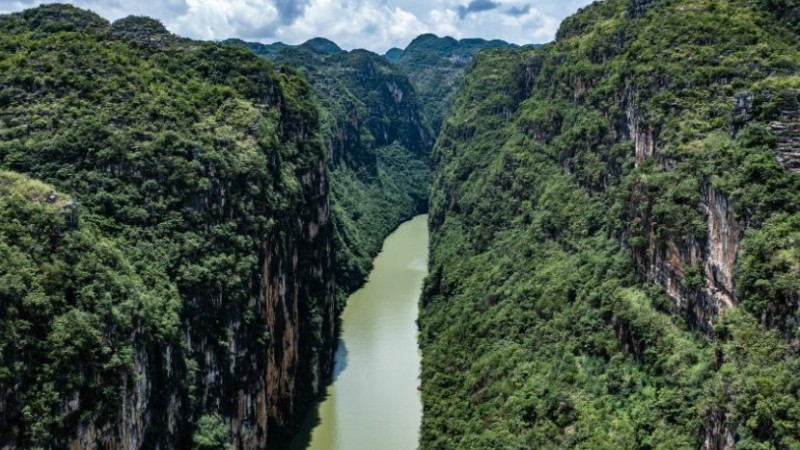Guardians of the waves: Former fishermen protecting finless porpoises
NANCHANG, Aug. 4 (Xinhua) -- Undeterred by the scorching heat of a sultry summer day in an eastern Chinese village, Xu Shenghe stood still on the boat's deck, his gaze fixated on the tranquil waters below as the morning sun grew increasingly fierce.
Suddenly, a burst of excitement escaped his lips: "A finless porpoise! Oh, two! A cub with its parent!"
In the blink of an eye, a fleeting black silhouette appeared above the hard-to-spot waves. Nevertheless, with the instincts honed by being the son of a fisherman and having spent his entire childhood by the lakeside, Xu estimated the distance and weight of the elusive finless porpoises with just a glance.
The 51-year-old ex-fisherman, with noticeable crow's feet, a weathered complexion and flushed cheekbones, has served as a lake patroller for three years in Jiangxi Province's Hukou County. His patrol area encompasses the meeting point of Poyang, China's largest freshwater lake, and the mighty Yangtze River.
Known as the "giant panda of the water," the Yangtze finless porpoise is under top-level state protection and serves as a barometer of the Yangtze River ecology.
"Most of the time, finless porpoises only have their noses above the water, so people cannot see them," Xu said, recording the time the porpoises appeared, their number and location on his mobile phone.
Xu and his 15 colleagues, all former fishermen, were organized into three squads, each tasked with patrolling different waters in Hukou. Each squad completes 10 patrols in five days every week, covering a distance of over 80 km daily.
Besides recording the activities of finless porpoises, they assist in rescuing stranded, injured or ill porpoises, preventing illegal fishing, and cleaning up garbage in the lake.
Last year, they rescued a wounded finless porpoise. "Cargo ships passing by are generally conscientious about avoiding high speeds to protect the animals, but sometimes, young porpoises become overexcited, separate from their mothers, and unknowingly dart toward the ships," Xu explained.
Amid a scorching heatwave sweeping China, Poyang Lake entered its dry season in late July, the earliest start to the season since records began in 1951, posing challenges to both fish and patrollers.
"The drier the conditions become, the more action we need to take," Xu said. As the water level decreases, fish will congregate in deeper waters, attracting finless porpoises that feed on fish. However, the rise in fish concentration brings along a heightened risk of illegal fishing, a concern that patrollers like Xu remain ever vigilant about.
Having come from a lineage of fishermen, Xu shares a profound connection with water and finless porpoises, and bidding farewell to their fishing careers was a heartfelt decision he and his colleagues made to ensure the lake's sustainability.
"I just like watching finless porpoises, and I am very happy to contribute to protecting them and the Yangtze River," he said.
To restore biodiversity along the Yangtze River, China imposed a complete fishing ban in 332 conservation areas of the Yangtze River basin in January 2020. The move has since been expanded to a 10-year moratorium along the river's main streams and major tributaries, effective Jan. 1, 2021.
Due to the ban, more than 100,000 fishermen from over 300 fishing villages situated around Poyang Lake ended their traditional roles and embraced new identities ashore.
As part of the country's finless porpoise protection plan, lake patrolling squads have been set up along the Yangtze River. In Hukou, Xu was among the first to apply for the job and became a patroller in 2020.
"The squads in Hukou have patrolled more than 170,000 km since they were set up in June 2017, and have ensured the protection of the aquatic biodiversity. The numbers of various fish species and finless porpoises have witnessed a visible increase," said Lou Jianping, an official of the county's agriculture and rural affairs bureau.
According to the Ministry of Agriculture and Rural Affairs, the population of Yangtze finless porpoises had increased to 1,249 in 2022, up 23.42 percent from 2017, with 492 finless porpoises living in Poyang.
"Protecting the finless porpoises is protecting ourselves," said Xu, as he wrapped up his morning patrol, his T-shirt soaked with sweat. Despite the fatigue, he was exhilarated having encountered several finless porpoises on his rounds.
Photos
Related Stories
- Pic story: local family devoted to control of desertification in Tongliao City, N China
- Technical, technological measures facilitate restoration of seagrass beds
- New technologies enhance freshwater lake preservation
- China a doer on ecological conservation, climate governance: spokesperson
- Historic changes in China attest to its progress on ecology
Copyright © 2023 People's Daily Online. All Rights Reserved.









